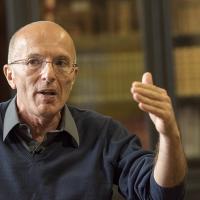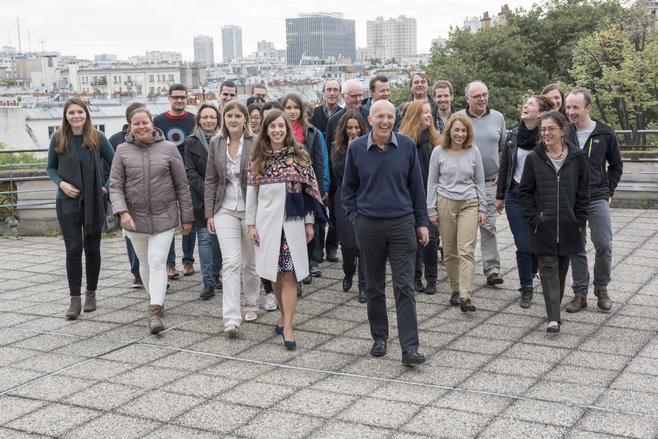
Food, Global Health Reading time 7 min
Daniel Tomé, a man of reference
Published on 16 December 2016
“I guess my work wasn’t too shabby then”. Smiling and relaxed, leaning slightly over an organised desk, his hands laid flat before him, Daniel Tomé is surprised to learn he has been awarded the INRA prize for Scientific Excellence. He wastes no time cracking a joke: “I’m an undercover agent for INRA”. Despite such modesty, Daniel is no less an expert in the protein requirements and quality of intake of the global population. Indeed, he is the director of the research unit for nutritional physiology and eating behaviour, (PNCA) at INRA/AgroParisTech and a teacher. “It’s fun, and it’s relaxing” he says, with a shrug of his shoulders. He can’t help it, he’s a teaser at heart. Whenever he gets the chance, he slips an anecdote between two explications on key publications of his lab: double marking of the complete metabolism of proteins in humans. He jokes about the four months of work down the drain when he was doing his thesis: “The sample fell out of my pocket…”. His thesis was on applied protein biochemistry in nutrition, and the young researcher showed how high the stakes are for humans. That’s where his tone changes, becoming serious but not too serious: “I have always believed that INRA had a role to play there”.
The researcher
I’ve always been proud to be part of INRAE
Flashback to the mid-1980s. Human nutrition has yet to be developed at INRA. Daniel Tomé is training for clinical research in intestinal physiology and nutritional needs at the Saint-Lazare hospital (Inserm). Fast forward to the 1990s. He returns to INRA with a mission: develop research in nutrition. In 1995, Daniel becomes head of the PNCA unit. The leadership skills of the researcher, with 320 scientific articles under his belt and counting, are undisputed. All of his co-workers agree: Daniel sees the whole picture when it comes to his research and knows how to guide his team along the right path. To which he responds, his hands in his pockets while giving a tour of the animal and spectrometry platforms and the cellular culture and immunohistology labs, “It’s thanks to INRA that I was able to develop such an excellent research unit”. To advance science in human nutrition with a focus on proteins, experiments had to be run on people. The INRA research director therefore rallied support to recruit a clinician from APHP,* Robert Benamouzig. Together, they launched a volunteer centre for research at the Avicenne hospital in Bobigny. “That is where we establish protocol and carry out clinical trials for PNCA”, explains Daniel proudly.
Ever the optimist and enthusiast, Daniel threw himself body and soul into these projects, never doubting that he would succeed. And succeed he did, thanks to his determination and fighting spirit. His lab provides basic data which serve as a reference for the Codex alimentarius. This has opened up new avenues in research on questions relating to the processes that condition how protein intake is controlled and what role proteins play in determining eating behaviours and metabolic disorders.
The teacher
“Working with Daniel is like taking a ride in the fast lane. He’s hyperactive, but with a very calm demeanour”, says Gilles Fromentin, joint director of his laboratory and faculty colleague since their university days. “He created the curriculum for human nutrition at Agro”, he continues. A mission that was entrusted to him by Paul Vialle, President and Director of INRA and Director of AgroParisTech in the 1990s. “It was a fun challenge!”, says Daniel. His enthusiasm was convincing. The result: every year, this is where 60 engineers specialised in human nutrition are made. But training professors wasn’t enough for him; Daniel also teaches 200 classroom hours a year. “It relaxes me”, he says. Providing a link to and advisory role for the agri-food sector, Daniel created Anca in 2011, a corporate sponsorship scheme.
The expert
INRA can play a greater geo-political role in nutrition
Since the 2000s, this discreet researcher has been an expert committee member of the WHO, the FAO, EFSA and Anses*, who determine recommendations for protein, amino acid and vitamin A, B, C and K intake, among others. Conclusions on recommended nutritional intake have a major impact. For example, in 2007, the WHO revised protein intake upward - from 0.75 to 0. 83 g/kg weight/day. Daniel remembers how hard it was (it took 5 years) for experts to agree on new levels. Since then, the data is used as nutrition benchmarks in countries and organisations around the world. “The issue of protein coverage for the world population in 2050 is all the more important in light of the current debate over different sources of proteins. We must re-think our standards with the modern tools we have at our disposal. Major international organisations need data. INRA is in a position to provide accurate and quality information to serve as a reference”. From behind his thin glasses brought back from India, Daniel’s scope of vision goes even further: “It all comes down to the questions INRA poses about agricultural strategies. The Institute can play a greater geo-political role when it comes to personalised nutrition, to evaluate and fine-tune the needs of populations”.
Making personalised nutrition a top priority at INRA
Among the future goals of his laboratory, Daniel Tomé intends to develop techniques to track the trajectory of molecules and make the mass spectrometry platform an international lab where samples can be taken quickly and measurements made. Projects are underway with the FAO and IAEA (International Atomic Energy Agency) on the quality of each amino acid. Daniel is working on projects to grow protein-rich crops, especially in Morocco and India, to tap into supplies of local cereals. “INRA is a giant, and that’s a big advantage. Few other organisations in the world have the same driving force. It’s the biggest agricultural and food research outfit that can still orient its own research strategies”.

- 64 years old (D. Tomé is now retired)
- 2 children
- Hobbies: Cinema, running
- 1976: Research assistant, INRA Nantes, Food Science Unit
- Thesis on applied protein bio-chemistry in nutrition, University of Nantes
- 1984: Research scientist at INRA, seconded to Inserm, Saint-Lazare hospital, intestinal functions, diabetes and nutrition unit
- 1988: Director of research at INRA; Associate Director, Laboratory of Human Nutrition and Intestinal Physiology, Jouy-en-Josas
- 1990: Director, Laboratory of Human Nutrition and Intestinal Physiology
- 1995: Director of Research Unit for Nutritional Physiology and Eating Behaviour, INRA/AgroParisTech and Professor of human nutrition, AgroParisTech
- Deputy President (former president from 2007 to 2015) Department of Life Sciences and Health, AgroParisTech
- Expert Committee Member FAO/WHO/UNU
- 2007 report “Protein and amino acid requirements in human nutrition”
- President of working group Anses on proteins and amino acids (2005-2007).
- Reporter for EFSA on recommended nutritional intake of vitamin A (2015), C(2013) and proteins (2012) and for Afssa in 2007 on protein intake: consumption, quality, needs and recommendations.
- Associate Editor Journal of Nutrition (American Society for Nutrition)
- Academic Editor British Journal of Nutrition (Nutrition Society)
Awards and distinctions
- 2008: French Nutrition Institute Award
- 2013: Recipient of the Academic Awards
- 2016: INRA Award for Scientific Excellence
